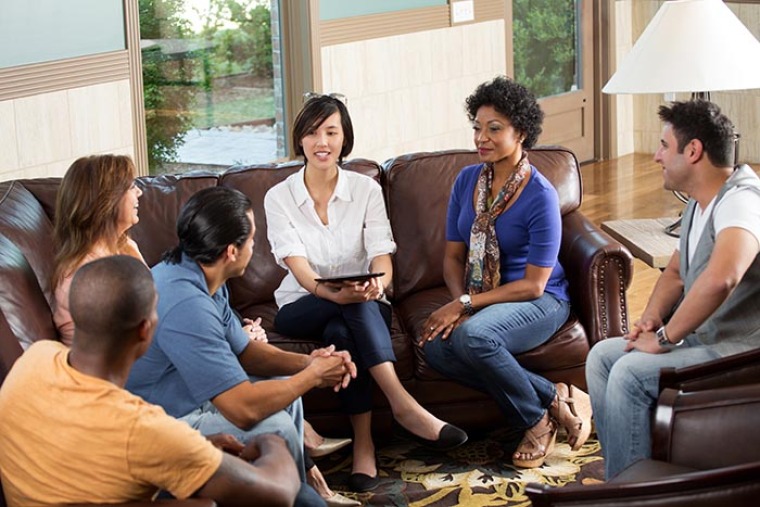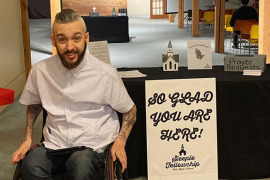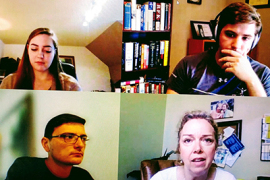Called to Counseling — Do You Need a License to Make a Difference?

As the mental health crisis deepens — highlighted by recent high-profile suicides — the need for compassionate, qualified counselors steadily increases.
The Bureau of Labor Statistics projects a 23 percent growth in the need for substance abuse, behavioral disorder, and mental health counselors by 2026. And with new laws in place governing insurance coverage for mental health-related illnesses, those who have been suffering from mental illness will now have access to the support they need — providing there are enough counselors available to give it. In this imperfect world, counseling is becoming an in-demand career.
As Christians, we know we can look to our Wonderful Counselor for peace throughout the many trials of life. Jesus tells us to come to Him when we are weary and burdened — but the Bible also tells us to carry one another’s burdens. Galatians 6:2 says that when we do this, we “fulfill the law of Christ.”
Counselors are privileged to fulfill the law of Christ through their profession, and there are a variety of counseling practices and therapies available today. Most people need help navigating the stressors of day-to-day life, and no one can avoid every problem. But some people have experienced trauma or extreme crisis or are suffering from depression or severe anxiety.
If you feel called to serve these and others who are suffering mentally or emotionally, you may want to pursue a rewarding career in counseling. But with the variety of opportunities open in the counseling field today, how can you decide which one is best for you?
Licensure vs. Non-Licensure
The first factor to consider when navigating the various types of counseling is licensure.
Licensure
Licensed Professional Counselors (LPC) typically hold an accredited master’s or doctoral degree in counseling and have passed a rigorous credentialing exam to earn their license. Additionally, they are required to complete at least 600 hours in practicums and internships and, depending on specific state requirements*, around 2,000 hours in a clinical setting training under the supervision of a licensed professional.
This gives them the knowledge and authority to diagnose and treat mental and emotional disorders as well as research the most effective treatment options for their clients. As licensed professionals, LPCs are free to bill insurance for services and establish private practices.
Because of the advanced training required to enter the counseling field as an LPC, as well as the valuable time spent in internships, practicums, and supervision, holding a license gives counselors greater opportunities for employment and professional advancement. They can work in clinical settings, private practices, behavioral health organizations, and clinical residential treatment facilities, among a variety of other counseling centers.
Non-Licensure
Counseling professionals who choose not to earn a license also provide valuable, practical wisdom and counseling to their clients. Many have earned advanced degrees in counseling, but have not undergone the government-mandated internships, practicums, or supervision required for licensure.
Non-licensed counselors often work for nonprofit organizations or in ministry settings and can also serve as case managers, child victim advocates, life coaches, pastoral counselors, or social services representatives. By not working under the umbrella of a government organization, they have the freedom to combine their faith with their passion for helping people.
Oftentimes, professionals in a variety of industries choose to enhance their career with a non-licensure counseling degree because it adds value to their current degree or gives them a better understanding of human behavior. A formal education in counseling — whether it leads to licensure or not — will sharpen both listening and people skills, helping you “fulfill the law of Christ” in any setting.

Popular Counseling Options
The second factor to bear in mind when planning a career in counseling is what type of counseling to consider. There are many specialties within the field, so find the one that’s right for you.
Marriage and Family Therapist
Marriage and family therapists (MFT) are licensed mental health professionals who are trained in psychotherapy and family systems. They are qualified to diagnose and treat mental and emotional disorders within couples, marriages, and families.
Professional Counselor
As mentioned above, Licensed Professional Counselors are equipped to address a variety of emotional, mental, and social disorders, and many earn further credentials in specialty areas such as addictions, disordered eating, or trauma and crisis.
School Counselor
School counselors are licensed professionals who work in primary or secondary schools and guide K-12 students through times of crisis or help them navigate life choices. They are trained in child and adolescent psychological development as well as in broader social practices, like creating career development plans.
Human Services Counselor
A human services professional is a non-licensed counselor who has been trained in human behavior and practical helping skills. Oftentimes they have specialized training in areas such as crisis response, addictions and recovery, life coaching, military resilience, or health and wellness.
Pastoral Counselor
A pastoral counselor is a ministry professional or church leader who is trained in psychology as well as the Christian understanding of human nature and God’s creation. Pastoral counselors are non-licensed (unless they have been additionally trained as an LPC) and offer predominantly biblical counseling, providing a balanced treatment of spiritual and mental health.

Find Your Counseling Program at Liberty University
Every counselor, whether licensed or not, has the opportunity to make a lasting difference in the lives of those they counsel. And no matter what kind of counselor you’d like to be, Liberty University has a degree program that can help you prepare for your chosen field with confidence. With a variety of licensure and non-licensure degree tracks available, in both residential and online formats, a master’s or doctoral degree in counseling from Liberty can help you develop into an ethical, well-trained pastoral or mental health counselor with the knowledge, values, and skills to help people make positive changes in their lives.
Liberty University is also home to the James C. Dobson Center for Child Development, Marriage, and Family Studies. You can learn from a curriculum that incorporates video lectures taught by Dr. James C. Dobson as well as other distinguished Christian psychologists and family therapists to gain specialized counseling training in advocacy and public policy, child and adolescent development, and marriage and family studies.
And because Liberty University is a Christian university dedicated to Training Champions for Christ, you’ll receive quality professional training as a mental health counselor from a faith-based perspective. Your counseling degree from Liberty will equip you to serve those who are suffering and meet the growing need for quality, compassionate mental health professionals as you fulfill the law of Christ.
Liberty University is accredited by the Southern Association of Colleges and Schools Commission on Colleges to award associate, bachelor’s, master’s, specialist, and doctoral degrees.
*Each individual state has its own specific requirements for licensure. Please see your state professional counselor license board for more information.
With more than 550 unique programs of study from the certificate to the doctoral level, including over 280 offered online, Liberty University is Training Champions for Christ to impact every corner of society. In addition to the university’s regional accreditation by the Southern Association of Colleges and Schools Commission on Colleges, many programs are accredited or otherwise recognized by specialized professional and accrediting agencies.
>>>Request for Liberty University Online degree info now.





